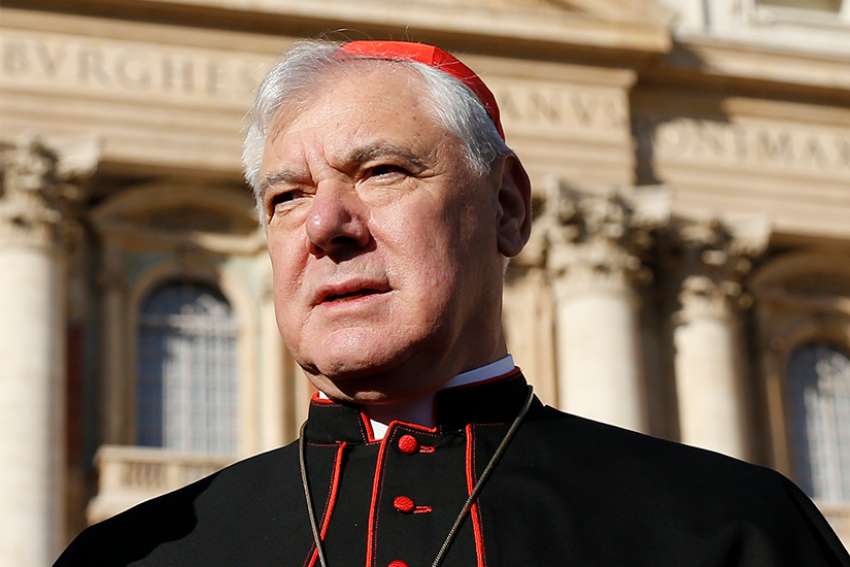“The current attempt,” he said, “to put in contrast the last three pontificates, with the pretext of imposing an heterodox teaching to the faithful is a crime against the Church and a betrayal of her mission and mandate, whose final task is that of preserving the faith authentically inherited by the apostles.”
Cardinal Muller spoke at the Lateran University, presenting the new book “Karol Wojtyla and Humanae Vitae,” by Pawel Galuska. The book traces Cardinal Wojtyla’s contribution to the drafting of Humanae Vitae.
Cardinal Muller’s remarks referred in particular to the article “Re-read Humanae Vitae in light of Amoris Laetitia” by the Italian theologian Maurizio Chiodi, who was recently appointed a member of the Pontifical Academy for Life.
The article, published at the end of January in the Italian Bishop Conference’s outlet Avvenire - is drawn from a lecture Chiodi gave at the Pontifical Gregorian University, as part of a series of conferences organized by the Jesuit university in Rome to celebrate the 50th anniversary of Bl. Paul VI’s encyclical.
In his lecture, Fr. Chiodi said that “there are circumstances that require the use of contraception,” because in these cases the “technical intervention does not deny the responsibility of procreative relationships.”
He also stressed that “the insistence of the Church’s Magisterium on natural methods cannot be interpreted, in my opinion, as a norm which is an end in itself, nor as a mere conformity with biological laws, because the norm points to an anthropology, to the good of marital responsibility.”
In the end, Fr. Chiodi said, “an artificial method for the regulation of birth could be recognized as an act of responsibility that is carried out, not in order to radically reject the gift of a child but because in those situations, responsibility calls the couple and the family to other forms of welcome and hospitality.”
By targeting Chiodi’s article, Cardinal Muller was in fact targeting any attempt to change or “reinterpret” the teaching of Humanae Vitae.
Professor Gilberto Marengo of the Pontifical Lateran University is presently heading a study group to trace back the genesis of the encyclical, and dismissed with CNA any attempt to change the teaching of Humanae Vitae.
However, Cardinal Muller described it as a secret commission, and said that this commission “will lead to no modification of the Catholic teaching.”
Cardinal Muller also stressed that the discussion is now “only based on dualism, and this will make a bad service to the Church.”
Speaking about Humanae Vitae, Cardinal Muller said that the encyclical “goes beyond the sterile polarization between artificial and natural birth regulation.” He also said that the encyclical is still current, as “the same questions are in place today.”
Cardinal Muller underscored that “secularization dupes men, depriving them of God,” saying secularization “does not imply any step forward in the path toward perfection. It is rather an anthropological deficit, as it abandons men to despair and uselessness. The paradigm of secularization is nihilism.”
Humanae Vitae, the former prefect of the Congregation for the Doctrine of the Faith maintained, “has a positive message, as it looks at men in their entirety.”
The book by Galuska contains a report drafted by a group of scholars in Krakow around Cardinal Karol Wojtyla, constituting Wojtyla’s participation in Paul VI’s contraception study commission. The cardinal sent the report because he was not able to get a visa from the Soviet regime and personally present it in Rome.
More importantly, the book publishes a letter Cardinal Wojtyla addressed to Paul VI in 1969. The letter praised the encyclical, noted that there were resistances and asked for a papal instruction to reiterate the message of Humanae Vitae.
The book’s presentation was the occasion to debunk some “fake news” about the encyclical.
Amidst a media campaign trying to dilute Humanae Vitae’s teaching, Cardinal Wojtyla’s 1969 letter was often characterized as an attempt to make the interpretation of the encyclical more rigid by asking Pope Paul VI to proclaim that its teaching was a dogmatic and infallible proclamation.
Msgr. Livio Melina, former president of the Pontifical Institute John Paul II for Studies on Marriage and Family, stressed that “saying that Cardinal Wojtyla asked for an instruction to reiterate the infallibility of the encyclical is just fake news.”
Instead, Melina said, that letter asked the Pope to explain that what Humanae Vitae said was part of the Church’s ordinary universal magisterium, and that the Church’s ordinary and universal magisterium is infallible.
Msgr. Melina explained that “the letter must be read carefully. Cardinal Wojtyla did not ask Paul VI to declare that the encyclical is infallible. He just asked to reiterate that the teachings in it are part of the Church’s ordinary [universal] magisterium. And that magisterium is infallible.”


